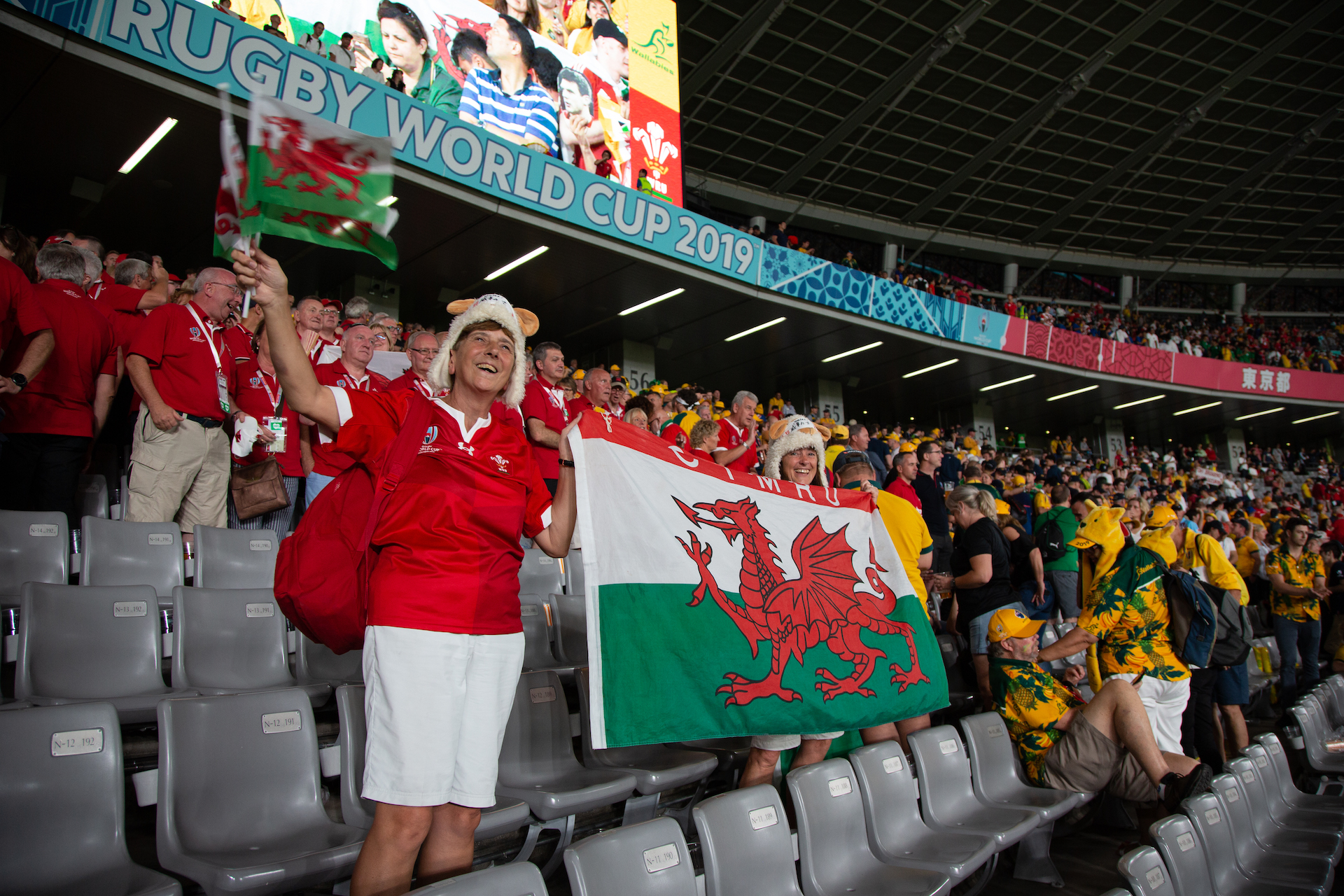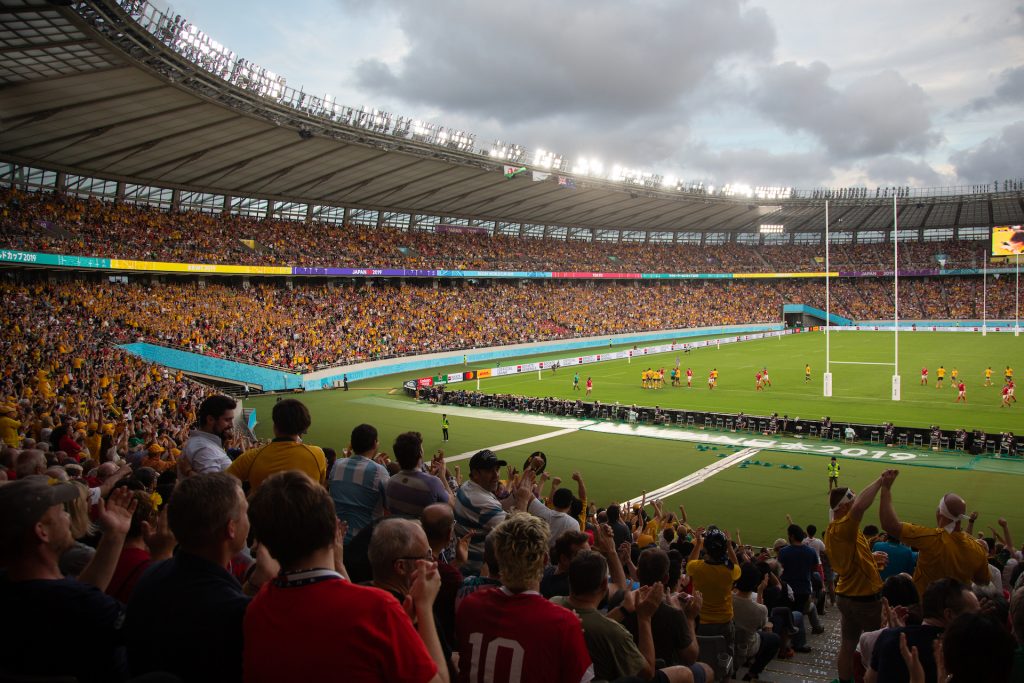Global sporting events bring nations together. Yes, rivals banter and boo, but a myriad of nations gathering because of a common love is also a beautiful sight. Sports bring about a quirky unity and solidarity.
This October, I attended a rugby match during the Rugby World Cup in Tokyo, Japan. Like the Japanese people who were present in the audience that October evening, I clapped for both teams, Australia and Wales, for we were citizens of neither of the countries who were playing. We didn’t need to be a fan of any particular team, because we found enjoyment and exhilaration just being a part of a global event.

Thousands of fans traveled to Japan for the 2019 Rugby World Cup to cheer on national teams representing 20 countries.
And, the camaraderie of sports is infectious. Dressing in gear to support your team—or dressing up as a Wallaby or Welsh dragon in this case—declares your affinity for and support of your team. At various points in the game, songs broke out among fans. At other times, songs were broadcast from the speakers and many people joined in—adding to the feeling of being part of something grand.
During the match, I sat next to an Aussie and a Welsh man who were good friends and had traveled together to watch the match. The Aussie explained some of the technicalities of the sport. He told me he actually prefers American football and watches it every Sunday. These were people I would have never connected with had it not been for the match. The love of sport is unifying, and forges connections.
The mass of humanity in the stadium made me feel a part of something much larger. I felt exhilarated experiencing an event that’s being broadcast live and being watched by fans around the world.
Imagine how much more so this would be if all of these people were gathering out of a common love of their Creator? I kept thinking how beautiful it would be if everyone in this stadium were singing praises to God and found their camaraderie in Christ.
That’s why it’s so important for Christians to use international sporting events as a means of engaging with the broader culture in order to build relationships in order to share the gospel.
Making connections
After the rugby match, two Japanese men posed for me to take their photo. They were wearing two rugby scarves, one for each of the teams playing, and were proud their country was hosting.
When I stopped to snap the photo of them, I took the opportunity to share with them about an upcoming viewing party of a rugby match that IMB missionaries in Tokyo were hosting at Tokyo Baptist Church.
One of the ministry goals the IMB team has for both the Rugby World Cup and the 2020 Summer Olympics is to connect Japanese people to God.
International sporting events provide an exceptional openness in the hearts of Japanese—for in these ‘festival’ times the regulated, and many times stringent, social and societal behaviors are loosened. IMB missionaries say that Japanese see festivals and sporting events as exceptions to general societal rules of interactions and the control of emotions, freeing them to be more relaxed and unrestrained.

IMB workers, national partners, local churches and volunteers worked together to reach thousands of rugby fans with the gospel during the 2019 Rugby World Cup.
I noticed this when a Japanese woman on the subway struck up a conversation with me and asked me if I had tickets to a rugby match and how I bought them.
I’m told talking to strangers is not a common occurrence in Japan, however, during the 1998 Winter Olympics in Nagano, one wizened IMB missionary shared how many Japanese initiated conversations with him and his wife, which was unprecedented.
As we ate tempura and Japanese curry at a restaurant, another missionary shared how, in the Nagano Olympics, people would approach their table and strike up conversations, asking them what country they came from, and what sport they were there to watch. The missionary said she and her husband had eaten at this restaurant many times before and no one had ever initiated a conversation with them.
Just as I met four people at a rugby match who I would have never met otherwise, these missionaries met people they would never have met had it not been for the Olympics.
Haka, Haggis, and Heaven
Tokyo Baptist Church and IMB missionaries hosted three viewing parties for matches during the Rugby World Cup. The goal was to begin to build relationships with the community and initiate gospel conversations.
Some who wandered into the complex of Tokyo Baptist Church one warm Saturday afternoon didn’t even know it was a church, or that churches had activities. Some were drawn in by the posters or were invited by friends and neighbors. Others noticed the booths and activities in the parking lot. Still others heard that a famous rugby player was there.
At a viewing party, retired New Zealand All Blacks player Timo Tagaloa shared his testimony. He also taught the famous Haka dance that is performed before all New Zealand rugby matches.
Japanese children made a square around Timo, squatting half-way as they began to mimic the motions and lyrics that accompany the ancient Maori tradition.
Other visitors took advantage of the opportunity to try new food, including Scottish haggis, Vegemite and chocolate-chip cookies.
The crowd then moved inside to watch the rugby match. This was the first time many had stepped foot into a church. Church members sat next to visitors during the match, talking and cheering on the teams, much like I did.
The goal of the viewing party was not just a mere introduction to the gospel, but the beginning of a long-term relationship to share the gospel.
It was a fantastic beginning.
Tokyo Baptist Church’s ministry pastor reported the church hosted 700 new visitors during the Rugby World Cup events. Two thousand Bibles were distributed, 2,700 flyers with links to testimonies of Christian rugby players were handed out, and 600 gospel tracts were distributed.
I’m praying for all the men, women and children who interacted with Christians during the Rugby World Cup. I’m praying that just as the nation and world found unity and solidarity in sports this fall, and they will again this summer at the Olympics, they will soon find that same unity and solidarity in Christ.

